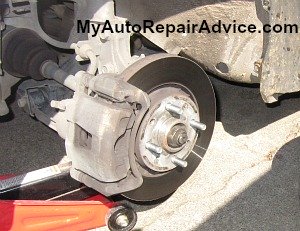How to Prevent Brake Fade
Brake fade is a very dangerous condition in which your brake pedal feels like it is working, but your car does not stop. In some case, it can happen even if your vehicle's brakes are new and the entire braking system is in good working condition.
What Causes Brake Fade?
Friction Fade
This is the most common and main cause of brake fade. Friction fade often occurs when the driver presses lightly on the brakes (just enough to slow the vehicle) with letting go while driving down a very long hill.
Normally heat dissipates just fine because the driver steps on the brakes and lets off... but if the driver keeps pressing on the brakes and doesn't let up, the constant friction on the brake pads and rotor will create enormous amounts of heat. This heat buildup causes the friction surfaces of the brake pads and rotor to stop working correctly.
To prevent brake fade you should press on the brake pedal firmly, then let off to give them a cool down period. To further slow down your vehicle, you should downshift to a lower gear. If you are already experiencing friction fade, then you need to stop your vehicle and allow the brakes to cool down for an hour before proceeding.

Brake Fluid Fade
Brake fluid fade is probably the second most likely cause. Auto manufacturers call for brake fluid to be changed periodically. However some vehicle owners ignore these recommendations and don't bother replacing the fluid for years and years (this seems to happen more often for older cars and trucks).
This causes the brake fluid to degrade and absorb water and other debris. The water absorption causes the brake fluid to boil at a much lower temperature when it gets hot. When this happens, steam forms in the braking system and steam will compress (brake fluid will not).
When the fluid gets too hot, the brakes will feel spongy and will no longer will stop the vehicle. Fixing this is simple: Change your brake fluid periodically. Follow your manufacturer recommendations as to how often you should change the brake fluid. Most cars and trucks should have their brake fluids changed every two years or so.
Mechanical Fade
This is not a common cause of brake fade, but it does happen every once in a while.
Sometimes new brake pads have a resin in them and that resin can break down when the pads get really hot. As they break down, they produce gases that will cause the friction between the pads and the rotor to be lost. This in turn causes the brakes to stop working.
How to prevent brake fade: After installing new brake pads, avoid steep
hills and prolonged periods of braking for the first week or so. Very few brakes will cause this type
of problem but it is good to be aware of it.
If You Experience Brake Fade
If you find yourself going down a long steep hill and your brakes start feeling spongy or the pedal is getting hard, downshift into a lower gear. This will cause your engine and drive-train to slow by themselves and that will take some of the strain off the brakes.
Then you need to try to slow the vehicle to a stop and get off the road. When the brakes get this hot, they need to cool down for a long period of time. Once you get to the side of the road you need to let your brakes cool for at least an hour.
Do not touch the wheels, lug nuts or any part of the brakes! They will be very hot... hot enough to easily burn you. After cooling down, resume driving in the lowest gear first and slowly accelerate your vehicle to the desired speed.
BRAKE PROBLEMS - Causes and Fixes
New! Comments
Have your say about what you just read! Leave me a comment in the box below.